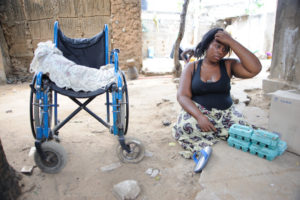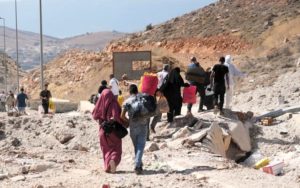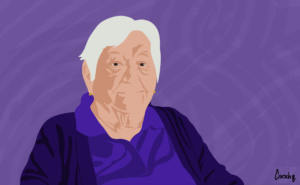Jamie McGoldrick has extensive experience in humanitarian affairs, international cooperation, economic development, media and political affairs. He was the UN Deputy Special Coordinator for the Middle East Peace Process, and Resident and Humanitarian Coordinator for the Occupied Palestinian Territory until last year. Prior to this, Mr. McGoldrick served as Resident/Humanitarian Coordinator in Yemen, Nepal and Georgia. Previously, Mr. McGoldrick worked for OCHA, the International Red Cross and Save the Children in field and headquarters’ positions.
It is hard to imagine that President Biden will reverse the designation of the Houthis as a “terrorist organization”. This designation was one of the last decisions taken by the Pompeo/Trump administration in their final days in office and highlighted the petulance and paucity of recent US foreign policy, especially in the Middle East. Pompeo’s announcement was met with alarm by the United Nations, international aid groups, and diplomats. Described as “diplomatic vandalism” and widely criticised by humanitarian organizations as the designation effectively removes any glimmer of hope for the more than 24 million Yemeni people dependent on international assistance. These people have struggled for basic survival and protection amidst six years of war, siege, famine, and countless diseases and epidemics including cholera and Covid 19 that have ravaged Yemen in recent years.
Pompeo’s statement said “the designations are intended to hold Ansar Allah (Houthis) accountable for its terrorist acts, including cross-border attacks threatening civilian populations, infrastructure, and commercial shipping.” Washington has sought to portray the Houthi movement, which has existed and ruled over northern parts of Yemen for generations, as a puppet of Tehran, something the Houthis have continuously denied.
Yemeni journalists note that the Houthis do not own a single commercial company, or own a single bank account outside of Yemen. In fact, ranking members rarely even travel beyond the country’s borders owing to the restrictions put in place by the Saudi-led coalition which controls air, sea and land access into Yemen.
The Houthis for their part called the move by Pompeo “terrorist” and declared, “we reserve the right to respond to any designation issued by the Trump administration or any administration.” Meanwhile, the government of President Hadi, based in Riyadh (and Aden), issued a statement in support of Pompeo’s decision while noting that it understands apprehensions about its “unintended consequences for the peace process and humanitarian efforts”.
Reports already indicate that as a direct result of the “terrorist designation”, local prisoner exchange deals have stalled and the UN has announced plans to stop supplying some water pumps in Sana’a with fuel. According to the Sana’a-based Ministry of Water, this could potentially harm up to four million people, including the many displaced people taking shelter in the city.
Mark Lowcock, the UN Under-Secretary-General for Humanitarian Affairs, warned of likely major repercussions for international assistance, including “a large-scale famine on a scale that we have not seen for nearly 40 years.” He added that exemptions to allow aid agencies to deliver supplies, as suggested by Washington, would not be sufficient to avoid a famine, adding “what would prevent it? A reversal of the decision”. Without the reversal the cost of food is likely to rise by as much as 400%, way beyond the reach of many humanitarian aid agencies operating in Yemen.
Normally, Yemen imports 90% of its food, nearly all of that through commercial channels. At present, aid agencies give Yemenis either vouchers or cash to buy commercially imported food in the market. But these same agencies are reliant on regular importation of essential goods and cannot replace the commercial supply system. World Food Program Chief David Beasley called for the United States to reverse its decision, stating that the designation is a “death sentence to hundreds of thousands, if not millions of innocent people in Yemen”.
Some commercial suppliers, banks, shippers and insurers are indicating that the risks associated with working in Yemen were already too high. Now they fear being accidentally or otherwise caught up in US regulatory action; doing business with Houthis could invite sanction and put them out of business or into jail. In addition, there are concerns that operational and material costs would be prohibitive to continue operating in Yemen in the current environment.
As well as a massive impact on the humanitarian situation, hopes for a diplomatic resolution have been dealt a major blow with the designation of the Houthis as a foreign “terrorist organization” as well as a “Specially Designated Global Terrorist” entity, with three Houthi leaders also black-listed. Diplomats are also concerned that the designation could impact UN-led peace negotiations. There is evidence that previous similar examples with unilateral counter-terrorism legislation shows that even basic logistical arrangements required for effective mediation could become exceedingly difficult.
Humanitarian leaders from the UN, and international NGOs such as CARE, NRC and Oxfam for the most part are not entering political territory by challenging the intent behind Pompeo’s decision, but rather its impact on the lives and survival of Yemeni civilians. Progress by aid agencies on access to people in need was already limited and the overall UN humanitarian appeal was seriously underfunded, meaning millions fewer Yemenis received aid, last year. This “terrorist designation” of the Houthis can only exacerbate the humanitarian plight of millions and deliver a devastating blow to the Yemeni economy.
From my time in Yemen 2015-18 as UN Humanitarian Coordinator, I saw first-hand basic infrastructure, hospitals and food production destroyed and often deliberately targeted. Since the start of the war in 2015, the Saudi-led Coalition has carried out tens of thousands of aerial strikes and the United Arab Emirates naval blockade has caused the deaths of at least thousands of innocent civilians, both directly and indirectly due to hunger and disease, and displaced 3.6 million people. Conservative estimates indicate that over 200,000 Yemenis have been killed in the war, mostly from what is described as “indirect causes” or “silent deaths” caused by disease, lack of access to clean water, medicines and starvation.
The war has created the “worst humanitarian crisis in the world” according to the UN, with even more people starving to death than dying as a result of military violence, including 75,000 children under the age of five. In 2020, at least half the population faced famine, and the worst cholera epidemic in modern history infected 1.2 million and led to at least 2,500 deaths; nearly a quarter of the cholera affected are children under five. The health, water, sanitation and other basic support services have been badly damaged as a result of the conflict, are poorly maintained and completely unable to support a desperately impoverished population. On top of this, COVID-19 has begun to spread uncontrollably across Yemen.
The US State Department suggested that there would be a proposed exemption system with licences for humanitarian supplies and assistance. Licences and exemptions for humanitarian agencies cannot solve the problem since commercial suppliers and local businesses import most of the food. According to humanitarian organizations working in Yemen, those licences from the State Department are not currently available and there are no confirmed details on who qualifies and which activities are covered. Organizations have been informed that these licences and exemptions apparently won’t be ready until the day that the “designation” was set to come into force, on 19 January. And this would happen at a time when there is a transition from the Trump to Biden administration inside the State Department itself.
In any case, these same humanitarian agencies fear their work in north Yemen will now be criminalized since the Houthis are the authority they have to deal with and negotiate with to operate in the areas under Houthi control. As is the case with Hamas in Gaza, under counter terrorism legislation, the US designation of a group as a terrorist outfit opens up sanctions on any individuals or entities doing business with those groups. Humanitarian organizations will instead distance themselves and avoid being caught up in counter terrorism legislation as it will have an impact on funding beyond Yemen itself.
It is clear Pompeo made this decision in an attempt to make it difficult for the incoming Biden administration to reach a negotiated settlement with Tehran. Pompeo is convinced that the Houthis are directed by Iran. For Biden to reverse the designation it would be politically problematic, alienating Saudi Arabia, a key US ally in the region. The original decision to brand Houthis as a terrorist organisation is consistent with the wider “maximum pressure” campaign on Iran that the US and some other member states allege are backing the Houthis. However, a suggestion in many quarters that the Houthis constitute little more than an Iranian proxy is wide off the mark as there is limited evidence that Iran controls the Houthis’ strategy. It is convenient for Saudi Arabia to hold this view of Iran’s role as it helps justify austerity domestically and consolidates the polarization in the Middle East region against Iran.
The consequences of the Houthis “terrorist designation” will be felt acutely across a country also hit hard by extreme hunger, cholera and Covid-19, as banks, businesses and humanitarian donors become unwilling or unable to take on the risk of operating in Yemen. As well as a massive crisis for the people of Yemen who rely on international assistance, this is also a major blow for the many dedicated humanitarian organizations and workers who struggle valiantly to deliver assistance in the most difficult of operating environments. This new designation, and all the complications it entails, makes humanitarian work extremely difficult at a time of greatest need.
Some observers have suggested that with this designation, the US has criminalized humanitarian aid assistance. But how much wiggle room does President Biden have with revisiting the Houthis being designated a terrorist organization, and reversing it? Normally, terrorist lists are reviewed every five years. How brave will the new President be regarding the plight of millions of Yemeni civilians? It is unlikely that the designation of the Houthis as a “terrorist organization” will be on the list of executive orders “in-tray” that the President sets out to reverse in the first days of the new Administration. Instead, it might make it to the “pending” tray. Therefore, it is critical that advocacy by the UN and NGOs is intensified for humanitarian assistance to be expanded for the people of Yemen. Hopefully with more adults in the new Administration, the US Secretary of State, and new management of USAID there will be a move quickly to embark on putting US foreign policy and humanitarian financing on a more responsible footing.
With many thanks from UAI to Yemeni artist ©Ahlam Almulaiki @cnvschq for the illustration.
A Mid-Upper Arm Circumference (MUAC) coloured measuring tape is routinely used in crisis settings to determine child malnutrition rates. Red indicates severe, acute malnutrition, yellow indicates a child is at risk, while green indicates that a child is well nourished.
The views expressed in this opinion piece do not necessarily reflect those of United Against Inhumanity.











